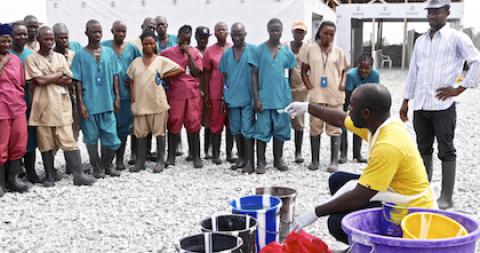“WHO must reestablish its pre-eminence as the guardian of global public health.” These words resonate throughout the final report of the Ebola Interim Assessment Panel, requested by WHO's Executive Board, chaired by Dame Barbara Stocking, and published this week. The findings of the panel present a devastating critique of WHO and the chronic inaction of its member states, which together created the conditions for an Ebola virus disease outbreak of unprecedented ferocity and human tragedy. The Stocking Report, as it will come to be known, sets out in agonising detail how the entire global health system fatally let down the people of west Africa.
Stocking reserves her harshest criticism for WHO. The delays in announcing a Public Health Emergency of International Concern (it took 5 months from announcing an “unprecedented outbreak” in April, 2014, to declaring a public health emergency on August 8) was “unjustifiable”. The agency's culture is unfit to manage an emergency response. Independent and courageous decision-making by the Director-General of WHO and her team “was absent in the early months of the Ebola crisis”. The agency was slow and reactive to events. WHO has lost its position as the authoritative body on health emergencies. It thought it could manage Ebola through polite behind-the-scenes international diplomacy. It failed to recognise that Ebola was a health emergency, not a diplomatic puzzle. And WHO's communication strategy for Ebola simply “failed”. The agency failed to communicate proactively and it failed to establish itself as the authoritative voice on the Ebola outbreak. Member States of WHO are not spared. They have persistently failed to take the International Health Regulations (IHR, 2005) seriously—a position that is “irresponsible” and “untenable” for global health security. They should adopt the notion of “shared sovereignty”. They need to invest in WHO (the Panel proposes a modest 5% increase in assessed contributions in 2016).
The Panel's recommendations are clear and forthright. Although WHO was severely criticised, Stocking argues that the agency should still take the lead for emergency health responses. But to do so, WHO must undergo “significant transformation”—not least, adequate funding and a change in culture. It must provide costed plans for establishing core public health capacities as set out in the IHR (2005). It should establish a new WHO Centre for Emergency Preparedness and Response, with an independent board that publishes a report on Global Health Security annually. WHO country and regional offices should be strengthened. The agency should take its role in accelerating the research and development of diagnostics, vaccines, and medicines more seriously. And WHO should do more to coordinate its activities with other parts of the humanitarian community. The IHR Review Committee should examine the value of an intermediate alert for a public health emergency, lowering the threshold at which the world can be warned of a new health risk. And sanctions against countries that violate the IHR should be considered.
The Panel makes clear that global health must be put at the centre of the global security agenda. But while its recommendations are cogent, there are three important omissions that deserve attention. First, the Panel does not address the vicious cycle within which WHO is caught. The reason why WHO is so poorly resourced is that it lacks the confidence of donors. As the agency continues to underperform because of chronic underinvestment, so that lack of confidence (and the resultant unwillingness to invest) only worsens. The Panel presents no way out of this endless circle of failure. Second, one of the most important responsibilities for governments is the preservation of public order and national security. In the context of Ebola (indeed, any health crisis), this means creating resilient health systems to protect populations from unexpected shocks, as explained by Mosoka Fallah and colleagues in a letter from Liberia's Ministry of Health this week. Universal health coverage should have been emphasised as a crucial instrument in building global health security. Finally, the Panel rightly notes that, “While WHO has already accepted the need for transformation of its organisational culture and delivery, it will need to be held accountable to ensure that this transformation is achieved”. However, nowhere does the Panel recommend the accountability mechanism to monitor and review the implementation of its recommendations. Our fear is that the unique opportunity presented by the Stocking Report will be squandered. We have little confidence that the governing bodies of WHO will deliver on the expectations of Stocking and her team. The responsibility for action therefore falls to WHO's Director-General. Dr Margaret Chan has 20 months to save her agency from further and possibly irreversible reputational damage.
[In 2007, responding to the exponential increase in international travel and trade, and emergence and reemergence of international disease threats, 196 countries agreed to implement the International Health Regulations (2005) (IHR). This binding instrument of international law is designed to "to prevent, protect against, control and provide a public health response to the international spread of disease.”]


Spread the word